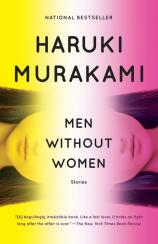Men Without Women: Stories
Review
Men Without Women: Stories
As an internationally acclaimed author of some 20 bestselling works of fiction and nonfiction, covering everything from cutting-edge short stories to a memoir about his own life as an avocational triathlete, Japan’s Haruki Murakami seems to have a magical literary finesse, an effortless touch that always feels “just right.”
That elusive and subtle finesse often focuses and transports the reader with startling power in his short story mode. In this latest collection, MEN WITHOUT WOMEN (superbly translated by Philip Gabriel and Ted Goossen), even the mind-numbing tedium and enforced ordinariness of the characters’ lives are lifted, if only briefly, beyond the unremarkable contexts in which we encounter them.
"MEN WITHOUT WOMEN manages to draw you from story to story with an inexplicable desire to grasp what lies at the core of each one."
Each of Murakami’s seven stories --- “Drive My Car,” “Yesterday,” “An Independent Organ,” “Scheherazade,” “Kino,” “Samsa in Love” and “Men Without Women” --- pushes insistently and imaginatively at the seemingly bland tone of the book’s collective title.
So just what are the words “men without women” supposed to mean anyway? Without exception, each of Murakami’s male characters has failed in some fundamental and life-limiting way to grasp what being with women really demands of them. In exploring each of these tales with their varied length, poignancy, tragic humor, resignation and unresolved details of self-awareness, I began formulating descriptive phrases to place between “without” and “women.”
For example, one could characterize the fatally infatuated Dr. Tokai in “An Independent Organ” as a man “without” the ability to recognize genuine love for “women,” or the title character in “Kino” as a man “without” the capacity to face personal pain caused by “women.” In each case, Murakami deftly targets the essence of “without” as it’s imperfectly experienced through a male social lens.
But there is never meant to be pristine clarity here, for the heart of every story rests in the flaws and occlusions of lives that don’t quite coincide with reality. In their isolation, whether physical, emotional, psychological, intellectual or even geographical, the characters in MEN WITHOUT WOMEN come to terms, often unwillingly, with their varied situations. And that’s the best one can say of their outcomes.
While Murakami delivers page after page of fluid yet rhythmic prose, unexpected left turns in imagery and elegant flashes of insight, he intentionally offers little in the way of substantial closing cadences. There is no real catharsis, no epiphany, no firmly resolved chord on which any of his characters can spring forward into another tonality of being. Still, MEN WITHOUT WOMEN manages to draw you from story to story with an inexplicable desire to grasp what lies at the core of each one.
Reviewed by Pauline Finch on June 23, 2017
Men Without Women: Stories
- Publication Date: May 1, 2018
- Genres: Fiction, Short Stories
- Paperback: 240 pages
- Publisher: Vintage
- ISBN-10: 1101974524
- ISBN-13: 9781101974520





